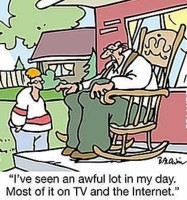Fact and friction
by Bill "damned proud of being modest" Ring
New for 2009



"Today is the tomorrow you worried about yesterday. And boy,
did you have that right!"
Note: Posts appear in chronological order from top down.
Episode 1: Turning the Page Jan 1, 2009

New year, new rules. First, I will date the blog entries for future reference. As I re-read some of last year's entries they actually seem almost prophetic if you could tell when they were written. Second, I will try to be a bit more regular in posting. (Yeah, right, "The blog is in the email.")
So what pithy observations do I have about the year past? Nothing much that you can't read in last year's postings. As far as the first 8 years of the 21st Century go, all I want is a written apology. Worthless government, worthless war, worthless stocks, worthless music, worthless movies, new worthless operating system from Microsoft, Britanny Spears, (in descending order of significance) etc.
On a positive note we elected an allegedly liberal, African-American President who appears to be calm and intelligent, which will make for a nice change on all points. For positive news in culture, stay away from the main-stream media crap and seek local, independent art and music. It's out there. The basic rule of thumb is: If it appears on TV, it sucks; if it's on the internet, who the hell knows? Kiss as many frogs as you can find the time for, and eventually you'll find a few prince(sse)s. I'll try to include some info on my own successful frog-smooching this year, along with the usual strange prose, stranger poetry, and curmudgeonly ranting.

Fasten your seat belts; it's going to be a
bumpy year.
Episode 2: Hey ma, look at me! Jan 11, 2009


The five-year-old bouncing up and down on the end of the diving board, refusing to jump until mom looks his way, holding up everyone else who wants their turn - what a perfect metaphor for the new media age. It doesn't matter what you say or how well you say it; the number of hits is everything. How many Facebook and Myspace "friends" do you have? Who cares if any of them even know who you are?
Old farts like me still imagine that people care about the right to privacy, but most internet users appear to be interested only in recognition at any cost. Embarrassing photos? Post 'em. Video of you and your friends robbing a convenience store? Straight to Youtube. (Yes, that really happened.)
Surf the net and you'll find all kinds of information on how to get more website visitors, draw more people to your blog, etc. Not much about how to find something worthwhile to say, however. That's a lot harder, and not of a great deal of interest to the five-year-old cannonballer in all of us.
Many of the great names of literature and art were underappreciated in their lifetimes and only gained fame over time. Here in the microwave culture it seems improbable that a Van Gogh or a Poe could or would struggle to produce a body of work that will live long after the creator's death. The proverbial 15 minutes of fame has become 15 seconds of name recognition. No wonder that 20-somethings are still listening to music recorded 40 years ago in preference to the disposable crap being released today.
Like most "critics" I find it a lot easier to complain than to suggest a solution. In writing this blog, I am to some extent jumping on that diving board myself. I like to think that what I am trying to get you to listen to has some substance beyond simple ego gratification, but the same impulse is still there.
Hey ma, look at me!
Episode 3: Good-good Bullshit or How To Try In Business Without Really Succeeding Jan 16, 2009


For a brief interval in the middle 1960's the anthem of my generation was All You Need Is Love, but before long that was supplanted by Money Changes Everything.
Have you ever heard a wealthy person described as a failure? Of course not. In some areas of endeavor there may be additional criteria to consider, but meeting those criteria will inevitably yield money as well. Even if an individual simply inherits wealth and does nothing but spend it, the word "failure" is not so much as whispered.
Once in a while you may hear it said that someone was successful without making money, but always in the context of contradicting an assertion that that person was a failure. Money = Success. Period. The sentence, "I wasted my life making money," is virtually nonsensical in this society.
We profess to admire self-less individuals like Mother Teresa, Gandhi, and so-on, but how often do you see a parent encouraging a child to go into charity work? Parents want their children to "be happy," which in this society is equated with making as much money as possible (or, for the more pessimistic, enough money as safely as possible).
So what's more important than money? The best answer to that is probably to roll your own. What is worthwhile to me may be less so to you, but as a generality I would say that "other people" might be a place to start. More time spent with people you care about, doing whatever you find fulfilling, sounds to me like a lot better idea than wasting your life making money.
Then again, why listen to me? If I'm so smart, how come I'm not rich?
Remember, February 10 is Umbrella Day


Happy Valentine's Day



Episode 4: Future Shocked April 21, 2009


Perhaps because I have too much time on my hands, I have been thinking a lot about the long view of history. In an earlier post I took this aberration about as far as it can go and engaged in some idle speculation about the possibility of human evolution in the distant future. Lately I have drifted a little closer to the present and wondered about the way future generations a century or two down the road will see us. Specifically, I have been trying to imagine which practices and institutions they will be shocked and appalled to discover we accepted without question.
Think there isn't anything left to reform? That we have already achieved the pinnacle of fair and rational behavior? I doubt it. As we look back on centuries past we see slavery; legal codes in which torture to obtain confessions was an accepted practice; voting limited not just to men, but to men who owned property; divine monarchy; etc. At one time or another each of these was universally seen as inevitable, rational, and beyond challenge or even discussion. In my own lifetime I have more than once seen the unquestioned assumption discarded and the unthinkable become conventional wisdom. Just today a beauty contestant was all but lynched for saying she didn't believe in gay marriage. Even more amazing, the contest organizers immediately and publicly denounced her statement. I believe very strongly that gay marriage should be legal, but I didn't think her words were all that dreadful. She simply said she wasn't raised that way and didn't believe in it personally. There was a time not so long ago when anyone who suggested that such a thing as gay marriage should even be discussed might have been lynched for real. Now sixty-three percent of New Yorkers think it's a peachy idea according to a recent poll! And need I mention segregation?
So what else is there? What parochial, blinkered
assumptions remain for future generations to scorn? I can think of at
least two candidates, but before I reveal them, I'd like to hear what
you think. Specifically, what unquestioned assumptions still exist in
our society to amaze and disgust our descendants? I'm speaking not of
things like abortion rights, where there is a lot of disagreement and
discussion, but of things almost no one questions. Any thoughts? Email
bill@folksmith.com or click the link below:
Episode 5: Back to the Future May 28, 2009


The response to the previous post was greater than usual, so I guess my question must have struck a chord. Thanks to you who responded with your suggestions. To make my idea a little clearer (which I suppose I should have done in the first place), I was looking for big, unquestioned aspects of contemporary society that virtually no one thinks we can do without (or, indeed, thinks about much at all). Two intriguing ideas that meet the qualifications were desk jobs and raising animals for food. I have trouble myself imagining how these could or would ever be eliminated, which is what makes them good answers.
My own candidates for what the future may regard as incomprehensible contemporary practices are prisons and immigration laws. First let's look at prisons.
There have been societies in the past that have functioned without prisons. True, most of these were small, relatively primitive agrarian societies in which everyone knew everyone else and the threat of social disapproval was not to be taken lightly, but even some larger societies have been able to get along without long term incarceration of those who misbehave. I should make it clear that I am drawing a distinction here between temporary restraint of a violent offender and prolonged institutional confinement. "Tie him up in the shed until we figure out what to do with him," or words to that effect, has undoubtedly been said since the earliest days of civilization, but locking "him" in a cage for years on end has not always been the answer. To be fair, I should point out that in some societies alternatives to incarceration have featured mutilation and death by torture along with less objectionable sanctions such as banishment and military service.
We feel we need prisons because we are afraid of being robbed, murdered, and so on. We want to make ourselves safe by locking up people who do things like this. The trouble is that we can't lock people up until after the damage is done, and that the brutality that takes place in prison often breeds far more violent criminals to be turned loose on us when their sentences expire. I am not sure that the existence of prisons doesn't make the problem of violence in our society worse. This is particularly so when we lock up people who are not physically dangerous with those who are.
Being a creature of my time, I can't visualize in every detail how a modern urban society without prisons would function. If someone committed a brutal murder would the enraged citizens hang the perpetrator (or someone they think might be the perpetrator) from the nearest lamppost? After all, if there is no prison the mob leaders won't be locked up. Of course just because there is no prison, that doesn't mean there is no punishment. In an increasingly technological society maybe virtual punishment would hold the same degree of importance as ostracism in a tribal society. Certainly for prisons to be eliminated we would have to expand our capacity to treat people who are pathologically violent. Would this lead to "treatment facilities" that are really prisons by another name? Of course this is possible. It happens today. I'm not envisioning a perfect society here, just one that has continued to grow up.
What does seem clear to me is that locking someone in a cage with brutal,
violent companions for years on end is a questionable treatment plan
for improving human character. To set people loose on the streets after
years of incarceration with virtually no chance of obtaining an honest
job for a living wage is a ridiculous way to try to make ourselves and
our children safer. Maybe the future will reveal a more sensible approach.
This post seems to be getting a bit long-winded,
so I'll save my thoughts on immigration laws for next time. Stay tuned,
and keep those cards and letters coming.
Email the prognosticator
Episode 6: And
Now, For Something Completely Different ...
June 12, 2009


Just a few pix of my new music playmates and myself. Twy Bethard
on fiddle and vocals, and Joe Crum on bass and more bass.
All are recent except for the last one of me, which is older than I care
to contemplate.
Email the oldest new face on the Ithaca music scene
Episode 7: Vere Are Your Papers? July 11, 2009

Time to drop the other shoe on the "future developments in society" theme. My second candidate for currently accepted practices that will have future generations scratching their heads and clucking their tongues is immigration law.
The basic unstated, and therefore unexamined, assumption behind immigration laws is that people should stay within the borders of the country in which they were born, and that to do otherwise requires government approval, which can be withheld for any reason, or for no reason at all. Stated this way, it sounds pretty totalitarian, doesn't it?
Taking the long view of history, the bar seems to have risen gradually in terms of human rights in most areas. Slavery used to be taken for granted; now it is near to being abolished. Torture, once commonplace, is now out of favor in the world community. Even the undeniably dreadful treatment inflicted on "enemy combatants" by the late, unlamented Bush junta seems almost mild compared to methods employed in centuries gone by. Voting seems to be all the rage...
Travel is different, however. Restrictions on the movement of individual human beings have grown steadily more severe since WWI. A huge and growing number of otherwise law-abiding people in the United States and elsewhere are known as "illegal aliens" - criminals by virtue of standing on the wrong side of an imaginary line without the right piece of paper. Whole families in refuge camps around the world are condemned to perpetual confinement in conditions that would not be tolerated in a US prison, again for the crime of being "displaced".
Putting all the usual BS aside, the real reasons for this are greed and fear. Those of us inside the bubble of prosperity known as the "first world" are understandably fearful of the idea that all people are really equal. Our message to the vast majority of the world's population that live outside the bubble is basically "We'd love to see you have all kinds of lovely civil rights, just keep your grubby hands off the money!" If those third-worlders could go wherever they want, wouldn't they come here and compete with us for jobs, bringing down our standard of living in the process? Wouldn't the population of our comfortable, prosperous cities swell until they resembled Mexico City and Rio? Wouldn't the free movement of people result in a world-wide leveling of the standard of living?
"Yes it would, " I can imagine some voice from the distant future saying, although that level may turn out to be a bit higher than we imagine once the wasteful apparatus of universal imprisonment is dismantled. "And what is your point? Why is it, precisely, that a new-born infant in Ohio is so much more deserving of future prospects than one born somewhere in Asia? "
The answer, of course, is that desert has nothing to do with it. We protect our wealth and power because we can, and justify it to ourselves with a lot of crap about how much more hard-working and intelligent we are than those backward peasants with whom we are afraid to compete.
So how can this possibly change? The answer is painfully and slowly. The leveling of the standard of living that we fear so much is happening already. The mobility of capital is enabling those "peasants" to compete without leaving home. Already most of our computer software and technical support comes from India. The globalization of the economy has only just begun, but the process looks irreversible. As time grinds on and the disparities in wealth between different parts of the world diminish, the perceived necessity for travel restrictions will disappear. I'm not particularly sorry that I won't be around to see the transition in progress, but if, as this leveling takes place, we can manage to figure out ways to live within our means and stop devouring non-renewable resources, maybe the future will be calmer and more peaceful, and the term "illegal alien" will be reduced to a puzzling anachronism.
Here's hoping.
Episode 8: Just how crazy are we? July 26, 2009


I get most of my news these days by going through Google News and pursuing whatever thread strikes my fancy. I try to make a point of going to different news outlets from Google and then checking out whatever interesting sounding links they have to other stories. You can find some bizarre and/or enlightening things that way. This doesn't have a lot to do with my main theme, but I just thought I'd mention it.
Anyway, I was Googling some news the other day, and among the front page headlines was an item about Steve Spurrier, a football coach in the SEC (one of many conferences in US college football). Apparently this "story" had been developing for several days and there were nearly 1,000 links to chose from to read about it. Briefly, a pre-season poll had been taken of the coaches in the SEC to determine their opinion (i.e. guess) as to which would be the best players in the conference during the coming season. No money, awards, or competitive advantages result from this poll, which probably ranks as one of the least important and least interesting items of trivia one could imagine, even for the most crazed sports fan. Possibly the players' mothers might be interested in the results, but even that is open to question.
Our story was not even about the poll results, but a follow-up on an earlier story about the "controversy" arising from Spurrier's failure to select the name of a quarterback who had been picked by every other coach in the conference. In today's thrill-packed episode, it was revealed that Spurrier had intended to select that player, but had inadvertently omitted his name, and that he had now contacted whoever was conducting the poll and made the correction.
Excuse the !@!#$% out of me?! A thousand stories about correcting a typo in a meaningless poll? WTF? I have long since become jaded by our bottomless fascination with the details of the doings of the not-so-great and almost famous, but this one was too much even for me.
I'm not an expert in psycho-babble, but someone once told me about "dissociative reaction," which (feel free to correct me if I have this wrong) involves feeling so overwhelmed by large, important concerns that one ceases to care and focuses instead on unimportant matters. (You don't give a damn any more where your kid goes to college, but you call the cops every time your neighbor parks 13 inches from the curb.) Sounds about right to me as a description of our modern mass culture.
Obama swats a fly and makes a joke about it, and those nitwits from PETA start whining about animal cruelty. Obama orders Grey Poupon mustard (made by Kraft right here in the good old USA, by the way) and the blogosphere goes ballistic about his being an elitist. Why do we care about this nonsense? I'm tempted to say it's because we are either stupid or crazy, but on further reflection I'd say it's probably both.
I wish I had a terrific point to make here, complete with recommendations for action you can take to help make it all better, but frankly it's all too much for me, and I don't give a damn any more.
But say, how about those Yankees?
Episode 9: What's Wrong With the World, Part 1 Aug 2, 2009



Danger, old fart alert!
Sooner or later it had to come to this. I'm over sixty and I'm writing about what's screwed up about modern times. How pathetic. "When I was a boy, blah, blah, blah …" At best I can plead guilty with an explanation. I really don't think everything was better when I was young just because I enjoyed myself more. Racism, sexism, censorship … I could probably write longer and more easily about things that have changed for the better in the past 50 years, but there seems to be less point in that. Positive changes are all well and good, but it's the stuff we're screwing up that we need to worry about. So without further apologies, forward into the bitch, dear readers. Like my intermittent series of postings relating to bullshit (The Affairs of Men, Parts 1 thru infinity) What's Wrong With the World will undoubtedly become a never-ending serial screed. It's a big, imperfect world, and like all cynics I am of course a frustrated idealist. (Is there any other kind?)
For no reason I could easily articulate, my first rant will concern the death of the "scene". You know - Paris between the wars, the Beat poets and later the folkniks in Greenwich Village, San Francisco and the Summer of Love, the early British Punk movement … times and places where some sort of creative explosion seems to arise out of nothing by a process of spontaneous combustion, where (as Hunter Thompson put it, approximately) the energy of a generation comes together in a bright, blinding flash. It seems like a long time since we've seen such a flash, and I have begun to think it may never happen again. To understand why, we have to ask, "What is a scene anyway?"
When you try to analyze what a scene is, why it is, even if it is, the closer you look the more it seems to disappear. On examination no one actually seems to belong to a scene, to be a beatnik or a hippie or whatever. In Paris between the wars no one even knew it was "between the wars". The scene is always someone else, some other place, not recognized until it is over, etc. A few people are actually doing something (art, politics, music, whatever) and not wasting much time thinking about any scene, while a lot of others are wandering around like tourists looking for the "real" scene, would-be disciples looking for a guru. There are certain bars, parks, cafes, bookstores where something seems to be happening, but most interactions are among seekers looking for they know not what, or between the seekers and con artists trying to take advantage of them to get sex, money, fame, etc. Some individuals are a little of all 3 - doers, seekers, and imposters all in one. No one can say who is real and who is a poser. It's all word of mouth, legend, hearsay. Everyone complains the scene is dead because of all the gawking hangers-on, but without them the scene doesn't exist.
It is next to impossible to have a scene now because the essence of the whole process depends on a tantalizing buzz about something that no one is entirely sure of. Today, as soon as anything remotely interesting starts to happen it is video taped, photographed, written about, analyzed, and spread all over the internet and the rest of the media before anyone can even get interested. All of us spend too much time getting our information from electronic media. We stay home with our TV's and computers instead of hanging out with real people, informed but uninvolved. Cocooning may be alright for the weary survivors of scenes gone by, but what are all these 20-somethings doing spending all their time on Facebook and its ever-multiplying clones? Why aren't they out doing drugs and getting in trouble like they should be? Just as well-behaved women don't make history, respectable people don't create scenes (or art, or literature, or political movements, or anything else worth while).
I say that it might be impossible for a scene to be born in this media age, but maybe that's just the old fart syndrome at work. I suppose no one in the ultra-conformist early 1950's could have envisioned the birth of the counter culture in a few grimy cellar cafes. Maybe a new scene could survive if only it could stay under the media's radar long enough. Or, given the ever decreasing attention span of modern culture, perhaps a scene could grow after the media has gotten bored with it and left it to develop unobserved.
If there is a message here, I suppose it's one you've heard from me before. "Turn off the damned computer, get out of the house, and go do something you care about with real people!"
Good advice. I should take it myself.
Episode 10: Flash Paradise (Fiction) Aug 14, 2009


A Fragmentary Reminiscence Approximately On a Certain Anniversary
On winter nights in the cold room the greatest warmth we had to share was the heat of our bodies, huddled naked between the bare, stained mattress and the threadbare grey wool blanket. Most mornings before rising we smoked wrinkled cigarette butts excavated from the overflowing ashtrays and crumbling dark brown roaches rescued from the ash-encrusted lids of quarter-full pop-top beer cans.
The crumbling plaster walls were haphazardly decorated with spray painted murals, large splotches of odd, clashing colors, and a bewildering assortment of posters, photographs and miscellaneous found objects: small, non-functional musical instruments, can-openers, interestingly shaped pieces of wood, and keys to long-forgotten doors.
The accordion-style window guards had been installed by a prior tenant who had presumably possessed something worth stealing. We kept them locked for the sake of my guitar, although the people to whom we regularly permitted entry to the apartment were far more likely to rob us than was the average passing stranger. Our friends (sic) were junkies, speed freaks, part-time prostitutes, pathetically incompetent hash dealers, politically motivated panhandlers, and so on. These were of course not mutually exclusive categories.
Our days were spent sleeping, handling out advertising leaflets (most of which we threw away to eliminate the middle-man), panhandling, sitting in the park if it wasn't too cold or if we were high enough not to care, and scrounging in dumpsters, garbage cans, and payphone coin return slots for the means of survival. By night we consumed the fruits of our day's efforts in the form of drugs, beer, plastic wrapped foodstuffs of dubious nutritional value, and second-hand paperback books. On two separate occasions we briefly possessed a small portable black and white TV scrounged from someone's garbage. The first stopped working after a week and the second was borrowed and never returned. Neither was missed.
The lives of our acquaintances followed a similar rhythm. Everyone had some sort of irregular (if not always strictly legal) employment. Non-union labor musters at the West Side piers, unlicensed massage, concession stands, pizza delivery, bikini-clad finger-painting modeling at the Electric Circus ... anything that paid cash and did not require regular attendance, presentable appearance or sobriety. Those who "did something" of a creative nature would vary their routine to work when the mood struck. In spite of the chaotic squalor of our lives we did manage to produce art, music and literature in surprising quantities, even if our only public was each other.
Stoned as we were, we might not even have been surprised to be informed
that this was paradise, or at least as close to it as we would ever
come. Decades later, as the wheels of fate grind our lives away (Joe
MacDonald's line, not mine), we look back, not in anger, but in awe
and confusion, not knowing what possibilities we found, lost, wasted,
imagined … If the universe is really unfolding just as it should,
Someone has a particularly demented sense of humor.
Email
the H****e
Episode 11: The Affairs
of Men, Part 4 Aug
30, 2009


First, a little history, (courtesy of Wikipedia):
Pan Am Flight 103 was Pan American World Airways' third daily scheduled transatlantic flight from London's Heathrow Airport to New York's John F. Kennedy International Airport. On Wednesday 21 December 1988, the aircraft flying this route—a Boeing 747-121 named Clipper Maid of the Seas—was destroyed by a bomb, killing all 243 passengers and 16 crew members.[1] Eleven people in Lockerbie, southern Scotland, were killed as large sections of the plane fell in and around the town, bringing total fatalities to 270. As a result, the event has been named by the media as the Lockerbie Bombing.
In 2001, Abdelbaset Ali Mohmed Al Megrahi, a Libyan, was convicted of involvement in the bombing and sentenced to life imprisonment. On 20 August 2009, the Scottish Government released him on compassionate grounds to return to Libya as he was suffering from terminal prostate cancer and had a life expectancy of less than 3 months.
And now today's
heart-warming follow-up,
"Compassion and Forgiveness, Government
Style"
(as reported by the Sunday Times
and repeated on bloomberg.com)
U.K. Justice Secretary Jack Straw agreed to
allow Lockerbie bomber Abdel Basset Ali al-Megrahi to be freed to salvage
negotiations with the Libyan government on an oil exploration deal,
the Sunday Times reported.
Straw wrote to Scottish Justice Secretary Kenny
MacAskill on July 26, 2007 to say al-Megrahi should be excluded from
a prisoner transfer agreement, where prisoners may serve the remainder
of sentences in their home country, the Sunday Times said, citing documents
given to the paper. He reversed this decision in a December 19, 2007
letter.
"The wider negotiations with the Libyans
are reaching a critical stage and, in view of the overwhelming interests
for the United Kingdom, I have agreed that in this instance the (prisoner
transfer agreement) should be in the standard form and not mention any
individual," the paper cited the letter as saying.
Straw's change came after negotiations stalled
between BP Plc, the biggest U.K.-based oil company, and Libya for an
oil and gas exploration deal that may be worth up to 15 billion pounds
($24 billion), the paper reported.
Therefore What?
So here is our staunchest ally in the "war against terror" sending a mass murderer home to a hero's welcome for the sake of the profit margin of a gigantic oil company. Is it just me, or do you think it might be appropriate to .. oh, I don't know ... how about [deleted on the advice of counsel] corporate executives and politicians from their plush air-conditioned offices and [deleted on the advice of counsel] from the nearest lamp post?
Is there nothing these scum can do that is sufficiently vile to get people uncontrollably enraged? Am I silly to get upset about one more proof that the people and institutions that control our society are so totally corrupt that they don't even know when to be ashamed?
Of course things are much better here in the US now that we have a "liberal" president who is definitely going to wind down one of our two wars just as soon as he gets around to it.
PS: For anyone who thinks I might have been unfair to describe Jack Straw and company as "scum" who don't know when to be ashamed, this followup story from the Washington Post, dated Sept 6, 2009.
In an interview published Saturday, British
Justice Secretary Jack Straw said trade considerations, particularly
a deal for oil company BP, played a major role in the decision to include
Megrahi in a prisoner transfer agreement between Britain and Libya.
Straw originally sought to exclude Megrahi from
any prisoner transfer deal with Libya, but in 2007 he changed his position.
He wrote in a letter to his Scottish counterpart that "wider negotiations
with the Libyans are reaching a critical stage" and that a blanket
agreement was in "the overwhelming interests for the United Kingdom."
The following month, Libya ratified an oil exploration
deal with BP worth up to $900 million.
In the interview, Straw told the Daily Telegraph
that Libya was a "rogue state."
"We wanted to bring it back into the fold.
And yes, that included trade because trade is an essential part of it
and subsequently there was the BP deal."
Episode 12: God Told Me To Do It Sept 9, 2009



If I came to you and said, in all seriousness, that a burning bush or a donkey or a voice from God had told me to do something peculiar, would you:
A) Congratulate me on being chosen as God's messenger?
B) Book me a rubber room at the nearest psychiatric facility?
If the "voice" had instructed me to kill my first-born child would you call the cops?
If I started assembling pairs of every animal I could lay my hands on in by back yard would you tip off the health department and the Humane Society?
If your answers to the above questions are "B," "yes," and "yes'," then what makes it any less ridiculous and/or insane when some joker in a turned-around collar spews nonsense like this in a building with pretty windows? Just because he claims this stuff happened a long time ago? I know fairy tales are usually set in a land long ago and far away, but I thought it was understood that fairy tales are fictional.
I could, and probably will eventually have a lot more to say on this topic in the future. What brings it to mind today is the Duggard kidnapping case. In Phillip Garrido we have yet another in a long succession of psychotic sex criminals whose day job is preaching their version of the "word of God." (I don't say "alleged criminal" because Garrido has previously been convicted and served time for another kidnapping and rape.)
I'm not about to make the logical error of asserting that any significant percentage of preachers are necessarily sex criminals, but it does seem that an inordinately high percentage of mentally disturbed child molesters gravitate toward that profession and find willing followers. My thought for the day is that a job description that includes treating absurd fantasies as if they were real and exhorting others to do the same is a natural fit for the deranged, particularly those who hear voices.
Listening to this crap once a week has long been a form of popular entertainment, although modern media have certainly reduced its appeal. Taking religion seriously and making political decisions on that basis is just plain crazy.
Quote for the day:
"The returning good sense of our country threatens
abortion to their hopes, & they [the clergy] believe that any portion
of power confided to me, will be exerted in opposition to their schemes.
And they believe rightly; for I have sworn upon the altar of God, eternal
hostility against every form of tyranny over the mind of man." - Thomas
Jefferson
Email
the Heathen
Episode 13: The Affairs
of Men, Part 5 Sept
26, 2009
(By rights this should be a postscript to episode 11, but since a couple of weeks have passed, I'll give it it's own heading.)
Just the other day Susan Atkins, former Manson follower/accomplice/brainwashing victim (you pick it) died in prison of a brain tumor after having repeatedly been denied parole. Since being found guilty of participating in the Tate/LaBianca murders she had reportedly denounced Manson, found God (the nice clean Christian one), married, and repented.
Whatever we may think of her sincerity, it seems pretty clear that she was nuts when she committed the murders, even if she didn't meet the ever-inscrutable standard for legal insanity, and with the passage of time had become a good deal more rational. It also seems clear that letting her die outside of prison was unlikely to pose much of a risk to the community. Unfortunately for her, no multi-million dollar oil deal was tied to her compassionate release.
Episode 14:
Is it really the stupid economy? Dec
30, 2009



Like all good bloggers I suppose I'm obligated to produce a year-end, or in this case a decade-end thumbsucker. (If you are unfamiliar with that term, it's old-fashioned newspaper lingo for an article that is short on research and facts and long on self-indulgent pondering.) So here goes.
Decades are usually referred to as "the twenties," "the sixties," etc. According to that system we have just completed the nothings. Whether that name is appropriate or not depends on how you mean it. The nothings were certainly eventful, but arguably they produced nothing very positive, except of course for the monumental historical turning point of the last presidential election. That the sequel to that election has been disappointing to many of us is less than surprising, but I'm willing to let the jury remain out a little longer on that question. Whether the troops now "surging" to Afghanistan and the others still stuck in Iraq are inclined to be so patient is another question. Stay tuned.
No doubt you have your own views on the past ten years, probably at least as relevant as mine, so I'll say no more on that score. Nor will I plague you with "ten best/ worst" lists. Your assignment for what's left of the holiday season is to come up with your own. If you care to email them to me maybe I'll publish some of them, as long as my name doesn't figure in any of the "worst" lists.
My main thought for this episode is the question of "the economy." I'm not going to waste your time arguing about the effect of various federal programs, the causes of whatever problems we face, and so on. People far more expert and far more interested than I will be happy to supply you endlessly with contradictory information on all of that. What has been on my mind is the more fundamental question of what the economy is, and what we should want from it.
Now okay, what most of us want from the economy is more money (i.e. power and pleasure) for ourselves. Stripped of a lot of complex jargon, this is essentially what the "marketplace" is all about. See the infamous "Greed is good!" speech from the movie Wall Street for a succinct if somewhat tongue-in-cheek exposition of this theme. But if that is what this "economy" thing is all about, and we have accepted as axiomatic the premise that it is the economy first and foremost that decides political questions, then what sort of future are we trying to create?
With deep regret I am about to commit the cardinal sin of all commentary. I am about to describe a problem without presenting any plausible path to a solution. I wish I could say I was just being lazy or leaving it up to you to see the solution for yourselves, but the truth is I'm not sure there is one. The best I can do is to excuse myself by saying that I fervently hope that someone wiser than myself can do better.
What got me to thinking about this was the question of whether or not we can spend our way out of a recession (depression?) by printing money and putting everyone to work by paying them with a currency backed by hot air and wishful thinking. This seems preposterous, and yet when I look at twentieth century history, I wonder. In 1939 the US was, according to most historians, still in the throes of the Depression. Then for six years we put everyone to work making bombs, tanks, etc. and taking it all overseas and blowing it up, killing people, and generally wasting and destroying a large part of the world. (I'm not saying there wasn't a compelling reason for doing this, only describing what happened.) During this time we printed more money and lent it to allies who, with the exception of Finland, never got around to paying most of it back. On the face of it I would have expected that all of this "violent wasting" (Look it up in Dante's Inferno if you are interested.) would have ruined the economy for decades.
So what happened? The war ended, we spent yet more newly printed money rebuilding Europe and Japan and sending the demobilized GI's to college and helping them buy homes, and suddenly the economy was just peachy and prosperity came marching around the corner to greet us with a huge cigar in one hand and a pastel washer-drier in the other. Try as I may to comprehend this, I just don't get it. What is this economy thing that can grow fat and happy on a diet of death, destruction, and deficit spending, and how sure are we that we should be rooting for it to succeed?
A famous economist once observed that in the long run we are all dead. This way of thinking seems to me to be embedded in the fabric of economic theory. Economic models regard the Earth as a virtually infinite source of water, fossil fuels, and other resources. The indicators all refer to current "activity" with no consideration given to the resources that are being consumed and the future consequences of that consumption. There are no economic indicators to estimate whether our great grandchildren are going to be have air fit to breathe or the means to eat and keep warm.
Today there are roughly 150,000 deaths and 300,000 births per day worldwide. Every day a number of new human beings sufficient to populate a small city is added to the world population. The United States consumes resources at a rate which, if matched by the rest of the world, would require six Earths to sustain us. And the rest of the world is hell-bent on catching up. Very little difficult arithmetic is needed to see where those trends lead. An economic model that regards increased consumption as a positive is unlikely to contribute to a solution.
As I warned you earlier, I don't have a handy solution to fix all this. The best I can do is to urge you to think about something other than this treacherous and tainted "economy" thing when making political decisions.
So, in spite of my cries of doom, have a safe and happy new decade. And if you are driving, be sure to have a car.

